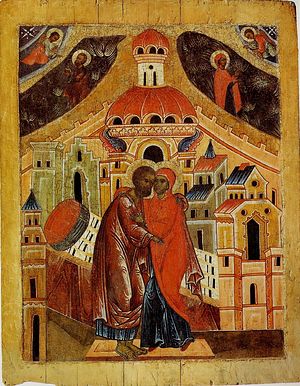The Gospel of Luke begins with a story about the circumstances surrounding the conception and birth of St. John the Baptist. There was in the days of Herod, the king of Judaea, a certain priest named Zacharias, of the course of Abia: and his wife was of the daughters of Aaron, and her name was Elisabeth. And they were both righteous before God, walking in all the commandments and ordinances of the Lord blameless. And they had no child, because that Elisabeth was barren, and they both were now well stricken in years (Lk. 1:5–7), we read in the Gospel according to the apostle Luke. Nevertheless, compared with this hymn to the righteousness of the Forerunner’s parents, the words of the angel who appeared to the prophet’s father may see strange to us: Fear not, Zacharias: for thy prayer is heard; and thy wife Elisabeth shall bear thee a son, and thou shalt call his name John (Lk. 1:13). Why was the righteous man’s prayer only now being heard, when he has already reached the limits of earthly life? Could it really be that God did not hear the voice of the Forerunner’s saintly parents?
This question is close to every Christian. Does God hear us? And why is he so often silent in answer to our questions? And if He answers, then why don’t we hear His answer? Doubt begets more doubts, and life becomes filled with indecisiveness, wavering, and fruitless seeking.
It is hard to justify God’s silence. Nevertheless, in this is the meaning of Christian life: to justify even the Savior’s silence—as an answer filled with true love. After all, God’s love is not blind; it is perfect, which means that it can refuse a request that does not bring a person benefit. Our faith should continually destroy the doubts of the mind with one argument: If God is silent it means He has a reason for it! This is the thought with which we should carry the news of the Good Savior to the whole world. We are called by our patience, by our faith to justify God’s silence before the crazy world, which demands that the Creator make Himself known without fail, obviously and unequivocally. In fact God is not silent; he speaks in the language of perfect love, which can only be understood by those who are ready to answer this love! And in this language even silence is filled with the tremulous recognition of His fatherly benevolence toward His creation. This is very important to accept and preserve in our hearts, so that we can answer our doubts in the moment when the cruelty of outward circumstances or other causes instigate us to doubt that God hears us. It is at precisely this moment that our faith must have it’s say: It means that the time has come when my Savior has entrusted me to witness to His love, to justify His silence before the whole world… This is a great honor—to hear God’s silence in our lives and to respond to it with gratitude!
There is also something different. Very few decide to ask God. For some it is too great a responsibility, while others are simply afraid that God will not answer. But we must ask. This is the healthy requirement of the human soul—to fill life with God’s answer. The lack of it testifies to a spiritual illness: unbelief. This path is mortally dangerous, because God does not need such a person—he is alien to Him. His life is filled not the Savior but with his own “I”. Consequently, sooner or later he will have to experience the bitterness of disappointment in both himself and the world around him.
There is only one way to escape the destructiveness of disappointment—to live according to God’s counsel, in His presence. However, for us this way of life, asking God, often turns out to be inaccessible because too many of our own expectations and hopes fill up our requests to God, not leaving any room for the Creator’s voice.
We ourselves don’t notice how our question grows into a demand. It seems to us to be absolutely innocent, it seems to be the natural development of our feelings and anxieties. However the first step in that direction has been made—we demand… Of course, in part this demand does not sound so self-assured. It comes in the form of a pious confession of the Creator’s omnipotence, like once in the desert the tempter approached the Savior: “If Thou be the Son of God…” (Matt. 4:3, 6). In the same way do our demands made to God begin with thoughts of the Creator’s omnipotence, with a secret reproach: “After all, You, Lord can do anything; You can set things up so that the answer would be unequivocal and obvious.” And as the mind craftily suggests: And anyway, the Savior Himself once said quite specifically: Ask, and it shall be given you; seek, and ye shall find; knock, and it shall be opened unto you...(Matt. 7:7).
And the person waits for an answer. But the answer doesn’t come, God is silent. Unfortunately, this happens rather often in our lives. We and the Creator are talking to each other in different languages, and we don’t understand what and how we are being answered. We wait to hear the thunder-like voice of God Almighty, we demand a clear answer to our prayers, we beg that our perplexities be resolved, and in answer we find ordinary people, immerse ourselves in ordinary circumstances, observe the same world, and the same life around us. The world has not changed, it seems to us; no revolutions have happened in it, and even in our modest life nothing has changed. Could it be so hard for God to answer? To come and show us?
Probably the prophet Elias awaited with similar feelings the appearance of God, announced to him by the angel in the Sinai desert. Holy Scripture talks about this without any extraneous details, but with sufficient exactitude: And he said, Go forth, and stand upon the mount before the Lord. And, behold, the Lord passed by, and a great and strong wind rent the mountains, and brake in pieces the rocks before the Lord; but the Lord was not in the wind: and after the wind an earthquake; but the Lord was not in the earthquake: And after the earthquake a fire; but the Lord was not in the fire: and after the fire a still small voice (3 Kings 19:11–12), and there was the Lord. As it turns out, in real life it really is simpler to see God in something extraordinarily miraculous, unusual, and flashy than it is to accept His Providence in everyday life… These expectations of meetings with the Almighty Creator of the world are too tempting to just refuse them and listen to the loving voice of the Savior in the advice of a close one… We expect and demand an answer that is obvious and definite, which leaves no room for wavering and doubt. But God leaves room for patience, love, meekness, humility…
Like us, the Jews were not at all expecting such an answer from God when they awaited their messiah, who was to subdue the nations and restore the might of Israel. However from this viewpoint the Gospel shows itself to be completely baffling: Couldn’t the Almighty Lord have clearly testified to the world of His coming? Why is it so complicated? Why on the Mount of Olives sounded not the voice of the Master, the Creator, or at least of a great commander, a king, but the meek, gentle voice of Jesus of Nazareth? Why did the Lord hide Himself from many people—couldn’t He have…?
God’s Providence for us is unceasing; we don’t need to look for it, we just have to listen to it, to stop. This is the portion of our faith, its living and healthy manifestation—the feeling of constancy and hope in God, and certainty that He always answers, in every moment, unceasingly.
Man is called to seek God’s will. This is the only thing that is worth spending your whole life seeking. Nothing else can bring happiness, or eternity. All of life’s problems begin in the place where together with God something more appears, something with which man tries to fill the insufficiency of his own efforts in his striving for the Truth.
In life we need to give place to God. He does not break in by force, but stands at the door and knocks: If any man hear my voice, and open the door, I will come in to him, and will sup with him, and he with me (Rev. 3:20). And this is the most important fact of the Christian life—God answers only those who seek Him, who are ready to find room for Him in their lives. Draw nigh to God, and he will draw nigh to you (Js. 4:8).






